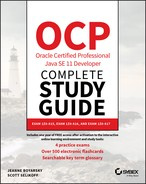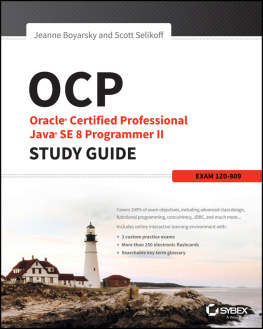Karamagi - Certified Entry-Level Python Programmer (PCEP) - Practice Exams
Here you can read online Karamagi - Certified Entry-Level Python Programmer (PCEP) - Practice Exams full text of the book (entire story) in english for free. Download pdf and epub, get meaning, cover and reviews about this ebook. year: 2021, genre: Computer. Description of the work, (preface) as well as reviews are available. Best literature library LitArk.com created for fans of good reading and offers a wide selection of genres:
Romance novel
Science fiction
Adventure
Detective
Science
History
Home and family
Prose
Art
Politics
Computer
Non-fiction
Religion
Business
Children
Humor
Choose a favorite category and find really read worthwhile books. Enjoy immersion in the world of imagination, feel the emotions of the characters or learn something new for yourself, make an fascinating discovery.

Certified Entry-Level Python Programmer (PCEP) - Practice Exams: summary, description and annotation
We offer to read an annotation, description, summary or preface (depends on what the author of the book "Certified Entry-Level Python Programmer (PCEP) - Practice Exams" wrote himself). If you haven't found the necessary information about the book — write in the comments, we will try to find it.
Karamagi: author's other books
Who wrote Certified Entry-Level Python Programmer (PCEP) - Practice Exams? Find out the surname, the name of the author of the book and a list of all author's works by series.
Certified Entry-Level Python Programmer (PCEP) - Practice Exams — read online for free the complete book (whole text) full work
Below is the text of the book, divided by pages. System saving the place of the last page read, allows you to conveniently read the book "Certified Entry-Level Python Programmer (PCEP) - Practice Exams" online for free, without having to search again every time where you left off. Put a bookmark, and you can go to the page where you finished reading at any time.
Font size:
Interval:
Bookmark:


- Exam name: PCEP Certified Entry-Level Python Programmer
- Exam Code/Exam Version: PCEP-30-01 | Status: Published
- Exam Level: Entry
- Associated Certifications: PCAP Certified Associate in Python programming (PCAP-31-02, PCAP-31-01)
- Pre-requisites: None
- Duration: 45 minutes (exam) + approx. 5 minutes (Non-Disclosure Agreement/Tutorial)
- Number of Questions: 30
- Format: Single-choice and multiple-choice questions, drag & drop, gap fill | Python 3.x
- Passing Score: 70%
- Language: English
- Courses Aligned: PCAP: Programming Essentials in Python (Cisco Networking Academy, instructor-led: Modules 1-3), PCAP: Programming Fundamentals in Python (Part 1) OpenEDG Education Platform, self-enroll/self-study
- Full Exam Price: USD 59
- Delivery Channel: OpenEDG Testing Service
- Testing Policies: Click here to view Testing Policies
- Exam Syllabus: Click here to view Exam Syllabus
- Sample Test: Click here to download a free PCEP sample test (TBA)
Objectives covered by the block (5 exam items)
- fundamental concepts: interpreting and the interpreter, compilation and the compiler, language elements, lexis, syntax and semantics, Python keywords, instructions, indenting
- literals: Boolean, integer, floating-point numbers, scientific notation, strings
- comments
- the print() function
- the input() function
- numeral systems (binary, octal, decimal, hexadecimal)
- numeric operators: ** * / % // +
- string operators: * +
- assignments and shortcut operators
Objectives covered by the block (6 exam items)
- conditional statements: if , if-else , if-elif , if-elif-else
- multiple conditional statements
- the pass instruction
- building loops: while , for , range() , in
- iterating through sequences
- expanding loops: while-else , for-else
- nesting loops and conditional statements
- controlling loop execution: break , continue
- simple lists: constructing vectors, indexing and slicing, the len() function
- lists in detail: indexing, slicing, basic methods ( append() , insert() , index() ) and functions ( len() , sorted() , etc.), del instruction, iterating lists with the for loop, initializing, in and not in operators, list comprehension, copying and cloning
- lists in lists: matrices and cubes
- tuples: indexing, slicing, building, immutability
- tuples vs. lists: similarities and differences, lists inside tuples and tuples inside lists
- dictionaries: building, indexing, adding and removing keys, iterating through dictionaries as well as their keys and values, checking key existence, keys() , items() and values() methods
- strings in detail: escaping using the \ character, quotes and apostrophes inside strings, multiline strings, basic string functions.
Font size:
Interval:
Bookmark:
Similar books «Certified Entry-Level Python Programmer (PCEP) - Practice Exams»
Look at similar books to Certified Entry-Level Python Programmer (PCEP) - Practice Exams. We have selected literature similar in name and meaning in the hope of providing readers with more options to find new, interesting, not yet read works.
Discussion, reviews of the book Certified Entry-Level Python Programmer (PCEP) - Practice Exams and just readers' own opinions. Leave your comments, write what you think about the work, its meaning or the main characters. Specify what exactly you liked and what you didn't like, and why you think so.


